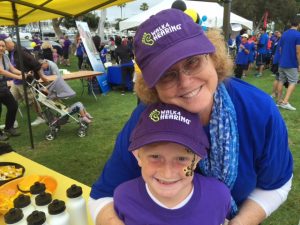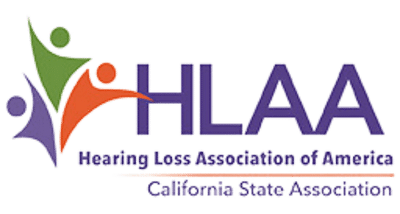
By Katie Wright
“Mom! Mom!” my daughter’s text read. “Connor didn’t pass his hearing screening!
My heart dropped. My grandson was 4 years old, still in pre-school. He and his mom were at his physical for kindergarten. The guilt I was feeling, passing this on to him, was overwhelming. I knew this was the beginning of an arduous journey for all of us, but especially for him.
Our family rallied. We whisked him off to the John Tracy Clinic where his hearing loss was confirmed: mild to moderate loss, the pattern is called a “cookie bite.” The clinic team was wonderful; we left the appointment with programmed hearing aids on loan so Connor could start kindergarten prepared.
In retrospect, the signs had been there for a while. If he were sitting on my couch at the other end of the room, he would have to peer around the high back to understand me. There were a lot of repeated directions that the family wrote off to his being a 4-year-old. There was the TV that was a little loud when it was just him watching. But the changes were so gradual that we totally missed what was happening.
Because Connor’s loss manifested after his language development, he was termed “post-lingual.” A team of teachers and staff at the school met with my daughter and me before school started to design an Individualized Education Plan (IEP). His needs were going to be mostly classroom and teaching modifications. As we met with the team, it was obvious no one except the itinerant Deaf & Hard of Hearing (DHH) teacher knew anything at all about meeting the needs of a child with hearing loss. I realized that it was going to be up to me to advocate for him because I was living it—and for my daughter because Connor was her little son. Since that day, I haven’t ever missed an IEP meeting.
Elementary school was relatively easy. His Dodger-blue hearing aids and the FM system he and the teacher wore were a novelty. None of his classmates really cared about them. “What are those?” “They help me hear.” “Oh.” And that was it. But fifth grade was the beginning of the rebellion; he fought the FM system. It was a battle to get him to remember to charge it, let alone to bring it up to his teacher at the start of the day.
Middle school, not so easy. No one wants to be different in middle school. Every morning he was supposed to get the FM unit from the nurse’s office, take it to each teacher, pair it and then hang around at the end of class to get it back from the teacher to take it to the next class. Connor wanted to be normal; he wanted to walk into class at the last minute with his friends and leave with his friends. His hearing aids already set him apart and then with the FM unit blinking red hanging around the teacher’s neck–he was done. The FM unit stayed in the nurse’s office. He won the battle. And then, when the pandemic hit, he won the war. With Zoom and an iPad, he didn’t need his hearing aids. When school resumed, he refused to wear them. So we struck a deal: his grades had to be kept up. He hasn’t worn his hearing aids since March of 2020.
I know this is typical of a teenager with mild-to-moderate hearing loss. He’s now a sophomore; his grades aren’t suffering because of his hearing. He knows how to survive. Will he realize he needs them when he studies more advanced subjects? Hear his baseball coach across the field? Hear his friends call out to him while they’re skateboarding? Will college be different? Time will tell. Connor is a smart kid; surely he’ll know when it’s time. Fingers crossed; those of us who love him live in hope.
Katie Wright is on the Board of Directors of the Hearing Loss Association of American, California State Association. As a former teacher, she works hard to insure that all kids with hearing loss have the tools they need to be successful students.



